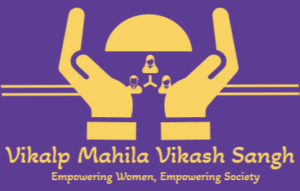Organisational Profile
VIKALP MAHILA VIKAS SANGH (VMVS)
About VIKALP MAHILA VIKAS SANGH (VMVS):
VIKALP MAHILA VIKAS SANGH (VMVS) is a leading women’s welfare group in the State of Bihar, India. Established to enable women, particularly women in marginalized communities, VMVS is dedicated to the empowerment of women and thereby improvement of their socio-economic status through a multi-programme development effort. This is an extended description of the organization and its main activities.
- History and Founding:
VIKALP MAHILA VIKAS SANGH was formed to work on the problems of gender inequality, social equality, and economic empowerment of women in rural and urban Bihar.
The institution has been trying to develop a platform where women can express their voices and actively participate in decision-making activities.
- Objectives:
Women’s Empowerment: VMVS primarily empowers women through awareness, training, and support systems that encourage economic independence and social leadership.
Educational Support: The organization emphasizes educating women and girls in rural areas, helping them access basic education, vocational training, and skill development programs.
Social Advocacy: It stands in support of women’s rights and seeks to address issues such as domestic violence, child marriage, gender-based discrimination, and caste-based discrimination.
Health and Well-being: This organization also increases women’s health, such as reproductive health, with sanitation and access to health and hygiene facilities.
- Key Areas of Work:
Economic Development: VMVS targets income-producing behaviors such as aid to women’s self-help groups (SHGs), and microfinance entrepreneurship. This helps women start small businesses and improve their financial stability.
Social Reform Initiatives: The agency carries out campaigns for combating dowry, child marriage, and domestic violence against women. It further suggests the significance of women’s involvement in local affairs as well as politics.
Skill Development: Different activities are conducted to teach women technical skills in the field such as tailoring, weaving, crafts, and others.
Community Building: VMVS reinforces women’s groups to create a culture of cohesion and action by community, at least in rural and tribal communities.
- Notable Projects and Programs:
Self-Help Groups (SHGs): The leading action taken by VMVS is the establishment of self-help groups, which support women’s access to financially important access to micro-loans and business management training enabling women to pursue small business enterprises and achieve economic independence.
Health Camps and Awareness Campaigns: The institution organizes health camps for women and children’s health, sanitation, and hygiene. They also conduct awareness campaigns to inform about the health and hygiene behaviours of women.
Advocacy for Legal Rights: VMVS implements all actions to provide women access to legal rights and legal support, such as services for victims of domestic violence or legal issues of property and inheritance.
- Collaborations and Networking:
VMVS cooperates with government agencies, non-governmental organizations (NGOs), and community organizations in the implementation of development programs.
The purpose of the organization is to network with national and international organizations to draw attention to the problems of women in Bihar and present policy proposals.
- Impact and Recognition:
The work done by Vikalp Mahila Vikas Sangh has been instrumental in creating significant social change in the lives of women residing in the areas where they work. A lot of women have been able to improve their income, continue or get further education, and become leaders in their society.
The organization has been recognized for its contributions to women’s welfare and empowerment in Bihar, receiving support from various donors and agencies.
- Challenges:
Although VMVS has been dramatically successful, there are still challenges, especially in deeply conservative and rural regions where traditional role expectations often block the advancement of women. Overcoming resistance to women’s autonomy and ensuring sustained funding for initiatives are ongoing concerns.
